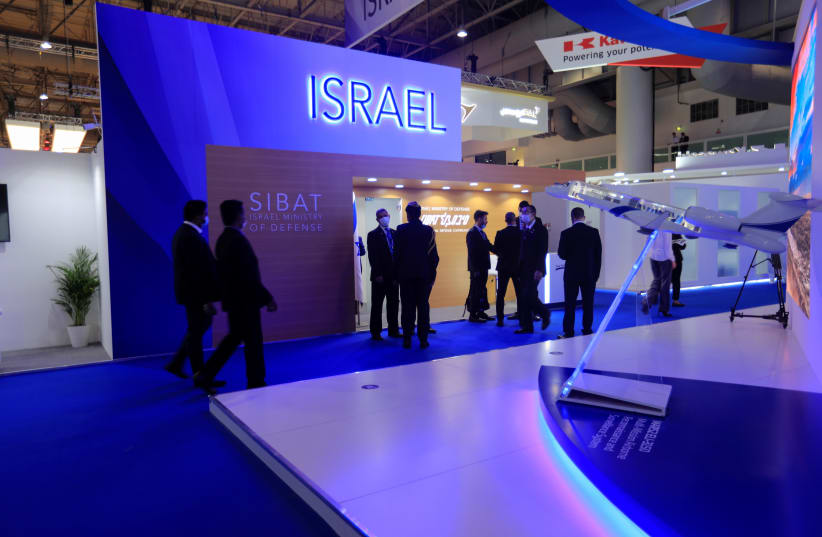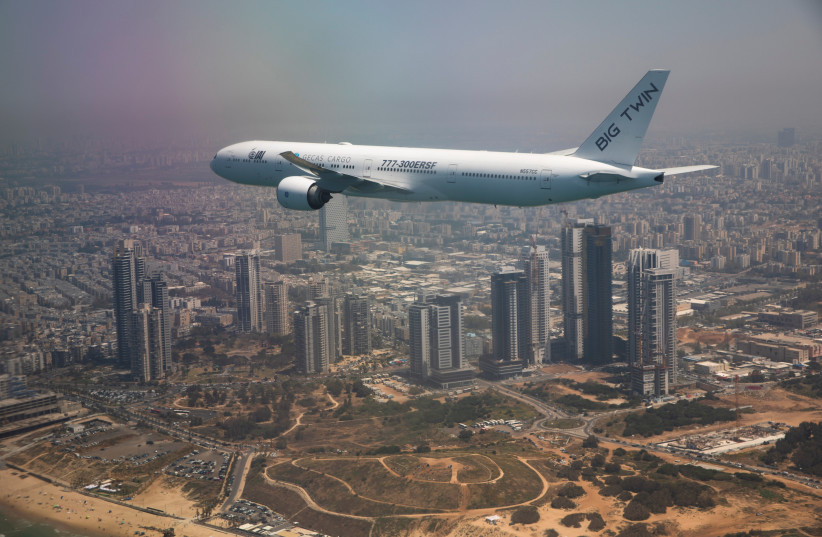The Dubai Air Show this year is raising eyebrows.
On the one hand, it’s an important gathering almost two years into the pandemic. It is also a place for giants in the aviation industry to show off their latest. Among those present are Boeing, with its 777X, which is making its debut. Russia’s Irkut Corporation also brought over a new jet and Russia is pitching its new jet fighter, dubbed Checkmate. On the other hand, the real story of the show is the role of Israeli companies.
Israel’s big three defense companies, Israel Aerospace Systems, Rafael Advanced Defense Systems and Elbit Systems are all in attendance. They are all bringing some of their latest technology and presenting their unique capabilities.
Elbit said on Sunday that it would establish a company in the UAE called Elbit Systems Emirates. “The Abraham Accords provide a sound basis for business collaborations in the region,” said Ran Kril, Executive Vice President for International Marketing and Business. IAI called its participation a historic first. IAI and Rafael both partnered with Group 42, an artificial intelligence (AI) and cloud computing company founded in Abu Dhabi, in the spring of 2020, even before the Abraham Accords, foreshadowing the eventual peace deal.
At the center of Israel’s role in Dubai are these symbolic milestones. Companies able to showcase their new technology illustrate how Israel can plug into the region. This is important because it’s not just about Israel or the UAE but about the emerging wider regional strategic paradigm that includes a series of countries such as India, Israel, Greece, the UAE, France, Bahrain, the US, the UK and Cyprus as key partners.
IAI CEO Boaz Levy said on the eve of the show that, “a year after the signing of the Abraham Accords, IAI is thrilled to participate in the Dubai Air Show and to broaden cooperation with business partners in the Gulf region.”
Indeed, cooperation looms large over this show.
Israel was doing joint naval training with the US, UAE and Bahrain in the Red Sea last week. Israel and members of the US Marines were also training together in the Negev.
Prior to that there was the Blue Flag drill that included eight air forces. The head of the UAE air force Maj.-Gen. Ibrahim Nasser Muhammed al-Alawi came to Israel to observe Blue Flag.
Commander of the Israeli Air Force Maj.-Gen. Amikam Norkin went to the UAE to see the air show and participate in the Dubai International Air Chiefs’ Conference (DIAC).
All of these events mark another “first” in the era of the Abraham Accords. There will come a time when we will no longer note these “first” events because they will become the norm: The first time that Rafael or IAI attended a conference in the UAE has now passed.
The Israeli role at Cyber Week, IDEX or any other major confab will be taken for granted soon. Israel is knitting itself rapidly into the region in a way that is not just a bilateral relationship between itself and the UAE, but a regional grouping that is underpinned in part by relationships with US Central Command and key allies and partners of the countries involved.
This growing regional partnering has ramifications that go beyond specific defense deals or even joint training. It’s about a consensus that views stability and moderation as key pillars of foreign policy.
This is in contrast to the policy of countries like Iran and Turkey that prefer confrontation in the region. That is why wherever Iran has a role there is poverty, chaos and civil conflict. In Lebanon and Iraq, people – including Iraq’s prime minister – are targeted for assassination by Iran’s proxies.
Meanwhile, Ankara has played an aggressive and threatening role in places like Syria and Libya, often heating up conflicts, rather than turning down the tensions.
However, the emerging consensus between Israel and the UAE is not all-inclusive. The US, for instance, ostensibly opposes the UAE’s outreach to Damascus.
For Israel, hopefully, Syria will dial back the Iranian role there. Reports say that the Assad regime may have been nonplussed by an IRGC-backed attack on the US Tanf garrison.
That could also be a talking point in regional media. What is clear is that there are a lot more meetings coming between Israel, Egypt, Jordan, Bahrain and the UAE and their partners in Asia and the West.
While Israel’s role at the Dubai Air Show can be seen through specific deals and companies – such as the participation of UVision, an innovative company that makes loitering munitions – the greater symbol is that Israel is now in the room with big players in the region.
In the past, Israel often felt isolated or even bifurcated from the region, not even included in US Central Command, for instance. Now, the inclusion of Israel in the room alongside others in a multilateral framework provides a space in which to build upon the Abraham Accords in a way that was only a dream a few years ago.

